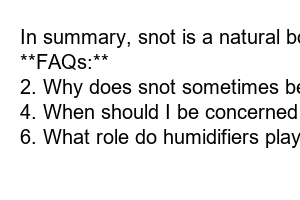코딱지가 자주 생기는 이유
Have you ever wondered why your nose produces so much snot? **It’s a natural and necessary bodily function** that helps to keep our nasal passages moist and free from germs. In this blog post, we will delve into the reasons why snot often occurs in English.
**What exactly is snot?**
Snot, also known as mucus, is a sticky substance produced by the mucous membranes in the nose and respiratory tract. It helps to trap dust, bacteria, and other particles, preventing them from entering the lungs.
**Why does snot occur?**
Snot occurs in response to irritants in the air, such as pollen, dust, or viruses. When these irritants enter the nasal passages, the body produces more mucus to help trap and remove them.
**How does snot work?**
The mucous membranes in the nose produce mucus, which is then moved along the nasal passage by tiny hair-like structures called cilia. This mucus eventually reaches the back of the throat, where it is either swallowed or expelled through sneezing or blowing the nose.
**Is it a sign of illness?**
While snot is often a natural response to irritants in the air, excessive amounts of snot or changes in its color can be a sign of illness. Yellow or green snot, for example, may indicate a bacterial infection.
**Can snot be beneficial?**
Believe it or not, snot actually plays a beneficial role in the body. It helps to humidify the air we breathe, trap harmful particles, and protect the delicate tissues in the nasal passages.
**How can I reduce snot production?**
To reduce snot production, you can try to avoid irritants such as smoke or strong odors, stay hydrated, and use a saline nasal spray to help loosen mucus. If you are experiencing excessive snot or have concerns about your nasal health, it is best to consult with a medical professional.
In summary, snot is a natural bodily function that helps to protect our respiratory system from harmful particles in the air. By understanding why snot occurs and how it works, we can better appreciate its importance in maintaining our overall health.
**FAQs:**
1. Is it normal to have snot every day?
2. Why does snot sometimes become thick and difficult to expel?
3. Can allergies cause an increase in snot production?
4. When should I be concerned about the color of my snot?
5. Are there any home remedies for reducing snot production?
6. What role do humidifiers play in managing snot production?

